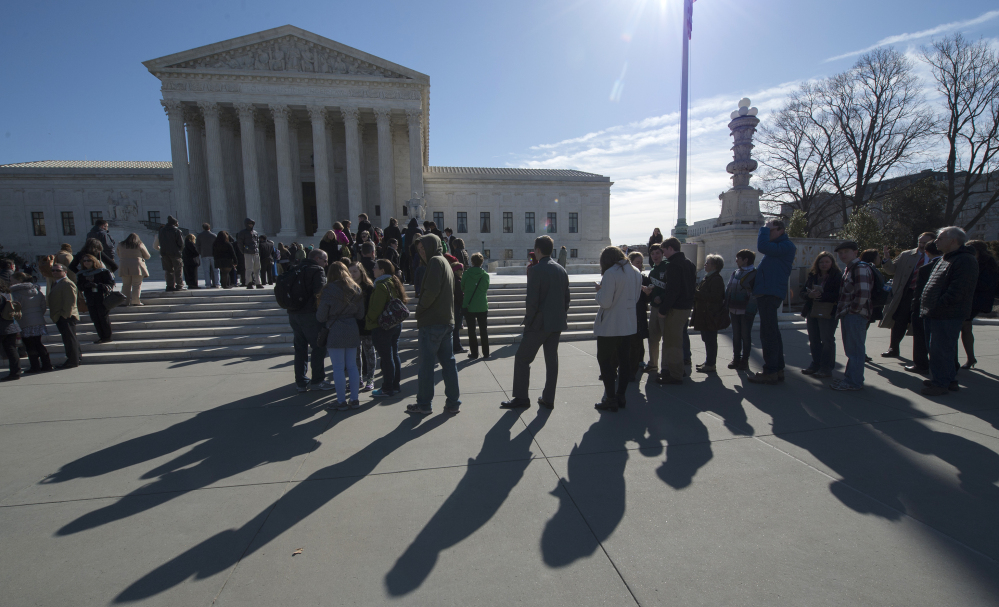WASHINGTON — In a sign prosecutors and the U.S. Supreme Court may be getting supremely steamed at protesters who’ve repeatedly disrupted court sessions, the latest group of demonstrators is facing the stiffest penalties yet.
Five people arrested last week after voicing displeasure with court decisions that removed limits on political campaign contributions now face charges including one that carries a maximum jail term of a year and up to a $100,000 fine – a sharp escalation from the possible penalties sought after two earlier protests.
The protest was the third time in just over a year the same group has disrupted the high court, and Chief Justice John Roberts warned during the outburst that anyone disrupting proceedings could be charged with criminal contempt.
But that warning didn’t stop last week’s demonstration, and a leader of the group behind the protests would not rule out future demonstrations, despite what he called an effort to crack down on the courtroom disturbances. “We are not going to be silenced,” said Kai Newkirk, whose group 99Rise opposes the influence of big money in elections.
While protests on the sidewalk outside the U.S. Supreme Court are common, until last year demonstrators had rarely broken the decorum of oral arguments inside the courtroom. In February 2014, however, Newkirk was removed from the courtroom after he stood and called on the court to overturn its 2010 Citizens United decision, which freed corporations and labor unions from some limits on campaign spending. It was the first protest to disrupt an argument session in more than seven years.
Just under a year later, in January, seven other members of the group disrupted proceedings by standing in succession to shout protests including “one person, one vote.” The protest coincided with the fifth anniversary of the court’s Citizens United decision.
The latest group of five demonstrators, including one who sang, interrupted court last Wednesday. The group said that protest was tied to the one-year anniversary of the court’s decision in McCutcheon v. Federal Election Commission, a case in which the justices struck down the overall federal limits on individual campaign contributions.
For each of the protests, 99Rise posted video footage on its website, despite a ban on cameras in the courtroom. The group managed to videotape the events despite increased security screening put in place after Newkirk’s initial protest. The group has largely refrained from discussing how it made the videos, though during January’s protest Supreme Court police also took into custody a person filming the demonstration with a video camera disguised as a pen.
Prosecutors have sought increasingly harsh punishments for the demonstrators.
In the January incident, the demonstrators ultimately faced three charges, each punishable by up to 60 days in jail and a $5,000 fine. The demonstrators in the most recent protest face two charges, one punishable by up to 60 days in jail and a $5,000 fine and the other by up to a year in jail and a $100,000 fine.
In another sign of their seriousness, prosecutors charged the latest demonstrators in federal court rather than in the local court, the Superior Court of the District of Columbia. Newkirk said he believes that change was made because prosecutors hope to get a more sympathetic judge willing to punish demonstrators more severely. Previous 99Rise demonstrators haven’t spent more than an overnight in jail.
Send questions/comments to the editors.



Success. Please wait for the page to reload. If the page does not reload within 5 seconds, please refresh the page.
Enter your email and password to access comments.
Hi, to comment on stories you must . This profile is in addition to your subscription and website login.
Already have a commenting profile? .
Invalid username/password.
Please check your email to confirm and complete your registration.
Only subscribers are eligible to post comments. Please subscribe or login first for digital access. Here’s why.
Use the form below to reset your password. When you've submitted your account email, we will send an email with a reset code.